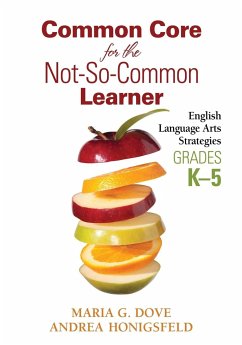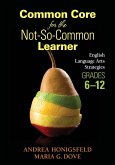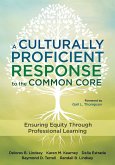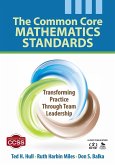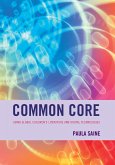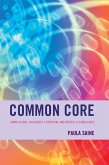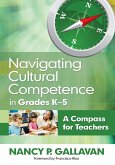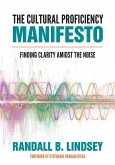Maria G. Dove, Andrea Honigsfeld
Common Core for the Not-So-Common Learner, Grades K-5
English Language Arts Strategies
Maria G. Dove, Andrea Honigsfeld
Common Core for the Not-So-Common Learner, Grades K-5
English Language Arts Strategies
- Broschiertes Buch
- Merkliste
- Auf die Merkliste
- Bewerten Bewerten
- Teilen
- Produkt teilen
- Produkterinnerung
- Produkterinnerung
The strategies you need to teach common standards to diverse learners Realistic and thorough, this teacher-friendly book shows how to help every student, including English Learners, students with disabilities, speakers
Andere Kunden interessierten sich auch für
![Common Core for the Not-So-Common Learner, Grades 6-12 Common Core for the Not-So-Common Learner, Grades 6-12]() Andrea HonigsfeldCommon Core for the Not-So-Common Learner, Grades 6-1229,99 €
Andrea HonigsfeldCommon Core for the Not-So-Common Learner, Grades 6-1229,99 €![A Culturally Proficient Response to the Common Core A Culturally Proficient Response to the Common Core]() Delores B. LindseyA Culturally Proficient Response to the Common Core31,99 €
Delores B. LindseyA Culturally Proficient Response to the Common Core31,99 €![The Common Core Mathematics Standards The Common Core Mathematics Standards]() Ted H. HullThe Common Core Mathematics Standards30,99 €
Ted H. HullThe Common Core Mathematics Standards30,99 €![Common Core Common Core]() Paula SaineCommon Core52,99 €
Paula SaineCommon Core52,99 €![Common Core Common Core]() Paula SaineCommon Core98,99 €
Paula SaineCommon Core98,99 €![Navigating Cultural Competence in Grades K-5 Navigating Cultural Competence in Grades K-5]() Nancy P. GallavanNavigating Cultural Competence in Grades K-534,99 €
Nancy P. GallavanNavigating Cultural Competence in Grades K-534,99 €![The Cultural Proficiency Manifesto The Cultural Proficiency Manifesto]() Randall B. LindseyThe Cultural Proficiency Manifesto20,99 €
Randall B. LindseyThe Cultural Proficiency Manifesto20,99 €-
-
-
The strategies you need to teach common standards to diverse learners Realistic and thorough, this teacher-friendly book shows how to help every student, including English Learners, students with disabilities, speakers
Produktdetails
- Produktdetails
- Verlag: Corwin
- Seitenzahl: 232
- Erscheinungstermin: 13. März 2013
- Englisch
- Abmessung: 254mm x 178mm x 13mm
- Gewicht: 445g
- ISBN-13: 9781452257822
- ISBN-10: 1452257825
- Artikelnr.: 36651506
- Herstellerkennzeichnung
- Libri GmbH
- Europaallee 1
- 36244 Bad Hersfeld
- gpsr@libri.de
- Verlag: Corwin
- Seitenzahl: 232
- Erscheinungstermin: 13. März 2013
- Englisch
- Abmessung: 254mm x 178mm x 13mm
- Gewicht: 445g
- ISBN-13: 9781452257822
- ISBN-10: 1452257825
- Artikelnr.: 36651506
- Herstellerkennzeichnung
- Libri GmbH
- Europaallee 1
- 36244 Bad Hersfeld
- gpsr@libri.de
Maria G. Dove, Ed.D., is a Professor in the School of Education and Human Services at Molloy University, Rockville Centre, New York. She teaches preservice and inservice teachers about the research and best practices for implementing effective instruction for English learners, and she supports doctoral students in the Ed.D. program in Educational Leadership for Diverse Learning Communities. Before entering the field of higher education, she worked for over thirty years as an English-as-a-second-language teacher in public school settings (Grades K-12) and in adult English language programs in the greater New York City area. She frequently provides professional development for educators throughout the United States on the teaching of multilingual learners. She also serves as a mentor for new ESOL teachers as well as an instructional coach for general-education teachers and literacy specialists. With Andrea Honigsfeld, she has coauthored multiple best-selling Corwin books, including Collaboration and Co-Teaching: Strategies for English Learners (2010), Common Core for the Not-So-Common Learner, Grades K-5: English Language Arts Strategies (2013), and Common Core for the Not-So-Common Learner, Grades 6-12: English Language Arts Strategies (2013), Collaboration and Co-Teaching: A Leader's Guide (2015), Co-Teaching for English Learners: A Guide to Collaborative Planning, Instruction, Assessment, and Reflection (2018). Along with other Corwin top-named authors, she co-authored Breaking Down the Wall: Essential shifts for English learner success (2020). In addition, she co-edited, Coteaching and Other Collaborative Practices in the EFL/ESL Classroom: Rationale, Research, Reflections, and Recommendations (2012) and Co-Teaching for English Learners: Evidence-based practices and research-informed outcomes (2020) published by Information Age. With Audrey Cohan and Andrea Honigsfeld, she coauthored Beyond Core Expectations: A Schoolwide Framework for Serving the Not-So-Common Learner (2014) published by Corwin and Team up, speak up, fire up: Educators, students, and the community working together to support English learners (2020) published by ASCD.
Preface
Acknowledgments
About the Authors
1. Introduction
Who Are Our Not So Common Learners?
The Standards Movement
Common Core Advances
Application of the Common Core to Address Individual Differences
Student Diversity and Teacher Challenges
What Is Not Covered in the Common Core Document
Focus on Research-Based Strategies to Address Learning Needs
2. Strategies for Academic Language Development
Why Diverse Learners Need Explicit Instruction in Academic Language?
Core Language and Vocabulary Strategies
Vocabulary Acquisition and Use
Knowledge and Application of Language
Conventions of Standard English
Anticipated Outcomes
Instructional Challenges
Promising Classroom Practices
Common Core Standards-(Un)Common Reflection Questions
Key Resources
3. Reading Strategies for Literature
Why Teaching Diverse Learners Reading Strategies Promotes Comprehension of
Literary Texts
Core Reading Strategies
Key Ideas and Details
Craft and Structure
Integration of Knowledge and Ideas
Range of Reading and Level of Text Complexity
Anticipated Outcomes
Instructional Challenges
Promising Classroom Practices
Common Core Standards-(Un)Common Reflection Questions
Key Resources
4. Reading Strategies for Informational Texts
Why Teaching Diverse Learners Reading Strategies Promotes Comprehension of
Informational Texts
Core Reading Strategies
Key Ideas and Details
Craft and Structure
Integration of Knowledge and Ideas
Range of Reading and Level of Text Complexity
Anticipated Outcomes
Instructional Challenges
Promising Classroom Practices
Common Core Standards-(Un)Common Reflection Questions
Key Resources
5. Reading Foundational Skills
Why Explicit Instruction in Basic Literacy Skills is Necessary?
Core Reading Strategies
Print Concepts
Phonological Awareness
Phonics and Word Recognition
Fluency
Anticipated Outcomes
Instructional Challenges
Promising Classroom Practices
Common Core Standards-(Un)Common Reflection Questions
Key Resources
6. Writing Strategies
Why Explicit Strategy Instruction Improves the Writing of Diverse Learners
Core Writing Strategies
Text Types and Purposes
Production and Distribution of Writing
Research to Build and Present Knowledge
Range of Writing
Anticipated Outcomes
Instructional Challenges
Promising Classroom Practices
Common Core Standards-(Un)Common Reflection Questions
Key Resources
7. Speaking and Listening Strategies
Why Speaking and Listening Skills Improve the Overall Academic
Development of Diverse Learners
Core Speaking and Listening Strategies
Comprehension and Collaboration
Presentation of Knowledge and Ideas
Anticipated Outcomes
Instructional Challenges
Promising Classroom Practices
Common Core Standards-(Un)Common Reflection Questions
Key Resources
8. Key to Successful Implementation: Collaborative Strategies
Why Collaborative Practices Help Meet the Common Core
Core Collaborative Strategies
Instructional
Curriculum Mapping and Alignment
Joint Instructional Planning
Parallel Teaching
Co-developing Instructional Materials
Collaborative Assessment
Co-teaching
Noninstructional
Joint Professional Development
Teacher Research
Joint Parent-Teacher Conferences and Report Card Writing
Planning, Facilitating, and Participating in Extracurricular Activities
Anticipated Outcomes
Challenges
Common Core Collaborations-(Un)Common Reflection Questions
Key Resources
References
Index
Acknowledgments
About the Authors
1. Introduction
Who Are Our Not So Common Learners?
The Standards Movement
Common Core Advances
Application of the Common Core to Address Individual Differences
Student Diversity and Teacher Challenges
What Is Not Covered in the Common Core Document
Focus on Research-Based Strategies to Address Learning Needs
2. Strategies for Academic Language Development
Why Diverse Learners Need Explicit Instruction in Academic Language?
Core Language and Vocabulary Strategies
Vocabulary Acquisition and Use
Knowledge and Application of Language
Conventions of Standard English
Anticipated Outcomes
Instructional Challenges
Promising Classroom Practices
Common Core Standards-(Un)Common Reflection Questions
Key Resources
3. Reading Strategies for Literature
Why Teaching Diverse Learners Reading Strategies Promotes Comprehension of
Literary Texts
Core Reading Strategies
Key Ideas and Details
Craft and Structure
Integration of Knowledge and Ideas
Range of Reading and Level of Text Complexity
Anticipated Outcomes
Instructional Challenges
Promising Classroom Practices
Common Core Standards-(Un)Common Reflection Questions
Key Resources
4. Reading Strategies for Informational Texts
Why Teaching Diverse Learners Reading Strategies Promotes Comprehension of
Informational Texts
Core Reading Strategies
Key Ideas and Details
Craft and Structure
Integration of Knowledge and Ideas
Range of Reading and Level of Text Complexity
Anticipated Outcomes
Instructional Challenges
Promising Classroom Practices
Common Core Standards-(Un)Common Reflection Questions
Key Resources
5. Reading Foundational Skills
Why Explicit Instruction in Basic Literacy Skills is Necessary?
Core Reading Strategies
Print Concepts
Phonological Awareness
Phonics and Word Recognition
Fluency
Anticipated Outcomes
Instructional Challenges
Promising Classroom Practices
Common Core Standards-(Un)Common Reflection Questions
Key Resources
6. Writing Strategies
Why Explicit Strategy Instruction Improves the Writing of Diverse Learners
Core Writing Strategies
Text Types and Purposes
Production and Distribution of Writing
Research to Build and Present Knowledge
Range of Writing
Anticipated Outcomes
Instructional Challenges
Promising Classroom Practices
Common Core Standards-(Un)Common Reflection Questions
Key Resources
7. Speaking and Listening Strategies
Why Speaking and Listening Skills Improve the Overall Academic
Development of Diverse Learners
Core Speaking and Listening Strategies
Comprehension and Collaboration
Presentation of Knowledge and Ideas
Anticipated Outcomes
Instructional Challenges
Promising Classroom Practices
Common Core Standards-(Un)Common Reflection Questions
Key Resources
8. Key to Successful Implementation: Collaborative Strategies
Why Collaborative Practices Help Meet the Common Core
Core Collaborative Strategies
Instructional
Curriculum Mapping and Alignment
Joint Instructional Planning
Parallel Teaching
Co-developing Instructional Materials
Collaborative Assessment
Co-teaching
Noninstructional
Joint Professional Development
Teacher Research
Joint Parent-Teacher Conferences and Report Card Writing
Planning, Facilitating, and Participating in Extracurricular Activities
Anticipated Outcomes
Challenges
Common Core Collaborations-(Un)Common Reflection Questions
Key Resources
References
Index
Preface
Acknowledgments
About the Authors
1. Introduction
Who Are Our Not So Common Learners?
The Standards Movement
Common Core Advances
Application of the Common Core to Address Individual Differences
Student Diversity and Teacher Challenges
What Is Not Covered in the Common Core Document
Focus on Research-Based Strategies to Address Learning Needs
2. Strategies for Academic Language Development
Why Diverse Learners Need Explicit Instruction in Academic Language?
Core Language and Vocabulary Strategies
Vocabulary Acquisition and Use
Knowledge and Application of Language
Conventions of Standard English
Anticipated Outcomes
Instructional Challenges
Promising Classroom Practices
Common Core Standards-(Un)Common Reflection Questions
Key Resources
3. Reading Strategies for Literature
Why Teaching Diverse Learners Reading Strategies Promotes Comprehension of
Literary Texts
Core Reading Strategies
Key Ideas and Details
Craft and Structure
Integration of Knowledge and Ideas
Range of Reading and Level of Text Complexity
Anticipated Outcomes
Instructional Challenges
Promising Classroom Practices
Common Core Standards-(Un)Common Reflection Questions
Key Resources
4. Reading Strategies for Informational Texts
Why Teaching Diverse Learners Reading Strategies Promotes Comprehension of
Informational Texts
Core Reading Strategies
Key Ideas and Details
Craft and Structure
Integration of Knowledge and Ideas
Range of Reading and Level of Text Complexity
Anticipated Outcomes
Instructional Challenges
Promising Classroom Practices
Common Core Standards-(Un)Common Reflection Questions
Key Resources
5. Reading Foundational Skills
Why Explicit Instruction in Basic Literacy Skills is Necessary?
Core Reading Strategies
Print Concepts
Phonological Awareness
Phonics and Word Recognition
Fluency
Anticipated Outcomes
Instructional Challenges
Promising Classroom Practices
Common Core Standards-(Un)Common Reflection Questions
Key Resources
6. Writing Strategies
Why Explicit Strategy Instruction Improves the Writing of Diverse Learners
Core Writing Strategies
Text Types and Purposes
Production and Distribution of Writing
Research to Build and Present Knowledge
Range of Writing
Anticipated Outcomes
Instructional Challenges
Promising Classroom Practices
Common Core Standards-(Un)Common Reflection Questions
Key Resources
7. Speaking and Listening Strategies
Why Speaking and Listening Skills Improve the Overall Academic
Development of Diverse Learners
Core Speaking and Listening Strategies
Comprehension and Collaboration
Presentation of Knowledge and Ideas
Anticipated Outcomes
Instructional Challenges
Promising Classroom Practices
Common Core Standards-(Un)Common Reflection Questions
Key Resources
8. Key to Successful Implementation: Collaborative Strategies
Why Collaborative Practices Help Meet the Common Core
Core Collaborative Strategies
Instructional
Curriculum Mapping and Alignment
Joint Instructional Planning
Parallel Teaching
Co-developing Instructional Materials
Collaborative Assessment
Co-teaching
Noninstructional
Joint Professional Development
Teacher Research
Joint Parent-Teacher Conferences and Report Card Writing
Planning, Facilitating, and Participating in Extracurricular Activities
Anticipated Outcomes
Challenges
Common Core Collaborations-(Un)Common Reflection Questions
Key Resources
References
Index
Acknowledgments
About the Authors
1. Introduction
Who Are Our Not So Common Learners?
The Standards Movement
Common Core Advances
Application of the Common Core to Address Individual Differences
Student Diversity and Teacher Challenges
What Is Not Covered in the Common Core Document
Focus on Research-Based Strategies to Address Learning Needs
2. Strategies for Academic Language Development
Why Diverse Learners Need Explicit Instruction in Academic Language?
Core Language and Vocabulary Strategies
Vocabulary Acquisition and Use
Knowledge and Application of Language
Conventions of Standard English
Anticipated Outcomes
Instructional Challenges
Promising Classroom Practices
Common Core Standards-(Un)Common Reflection Questions
Key Resources
3. Reading Strategies for Literature
Why Teaching Diverse Learners Reading Strategies Promotes Comprehension of
Literary Texts
Core Reading Strategies
Key Ideas and Details
Craft and Structure
Integration of Knowledge and Ideas
Range of Reading and Level of Text Complexity
Anticipated Outcomes
Instructional Challenges
Promising Classroom Practices
Common Core Standards-(Un)Common Reflection Questions
Key Resources
4. Reading Strategies for Informational Texts
Why Teaching Diverse Learners Reading Strategies Promotes Comprehension of
Informational Texts
Core Reading Strategies
Key Ideas and Details
Craft and Structure
Integration of Knowledge and Ideas
Range of Reading and Level of Text Complexity
Anticipated Outcomes
Instructional Challenges
Promising Classroom Practices
Common Core Standards-(Un)Common Reflection Questions
Key Resources
5. Reading Foundational Skills
Why Explicit Instruction in Basic Literacy Skills is Necessary?
Core Reading Strategies
Print Concepts
Phonological Awareness
Phonics and Word Recognition
Fluency
Anticipated Outcomes
Instructional Challenges
Promising Classroom Practices
Common Core Standards-(Un)Common Reflection Questions
Key Resources
6. Writing Strategies
Why Explicit Strategy Instruction Improves the Writing of Diverse Learners
Core Writing Strategies
Text Types and Purposes
Production and Distribution of Writing
Research to Build and Present Knowledge
Range of Writing
Anticipated Outcomes
Instructional Challenges
Promising Classroom Practices
Common Core Standards-(Un)Common Reflection Questions
Key Resources
7. Speaking and Listening Strategies
Why Speaking and Listening Skills Improve the Overall Academic
Development of Diverse Learners
Core Speaking and Listening Strategies
Comprehension and Collaboration
Presentation of Knowledge and Ideas
Anticipated Outcomes
Instructional Challenges
Promising Classroom Practices
Common Core Standards-(Un)Common Reflection Questions
Key Resources
8. Key to Successful Implementation: Collaborative Strategies
Why Collaborative Practices Help Meet the Common Core
Core Collaborative Strategies
Instructional
Curriculum Mapping and Alignment
Joint Instructional Planning
Parallel Teaching
Co-developing Instructional Materials
Collaborative Assessment
Co-teaching
Noninstructional
Joint Professional Development
Teacher Research
Joint Parent-Teacher Conferences and Report Card Writing
Planning, Facilitating, and Participating in Extracurricular Activities
Anticipated Outcomes
Challenges
Common Core Collaborations-(Un)Common Reflection Questions
Key Resources
References
Index

